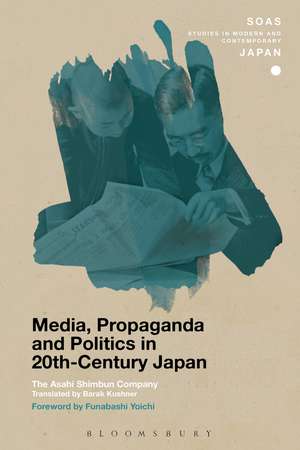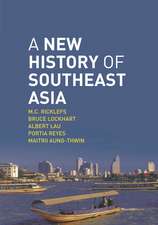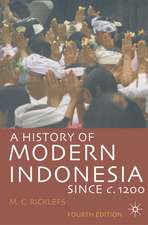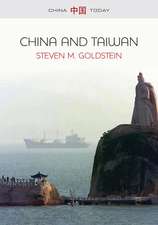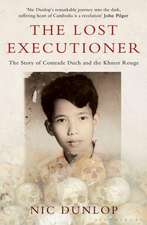Media, Propaganda and Politics in 20th-Century Japan: SOAS Studies in Modern and Contemporary Japan
Autor The Asahi Shimbun Company Traducere de Barak Kushner Cuvânt înainte de Yoichi Funabashien Limba Engleză Paperback – 24 aug 2016
| Toate formatele și edițiile | Preț | Express |
|---|---|---|
| Paperback (1) | 323.57 lei 6-8 săpt. | |
| Bloomsbury Publishing – 24 aug 2016 | 323.57 lei 6-8 săpt. | |
| Hardback (1) | 843.99 lei 6-8 săpt. | |
| Bloomsbury Publishing – 25 feb 2015 | 843.99 lei 6-8 săpt. |
Din seria SOAS Studies in Modern and Contemporary Japan
- 21%
 Preț: 218.00 lei
Preț: 218.00 lei - 30%
 Preț: 510.25 lei
Preț: 510.25 lei - 23%
 Preț: 228.76 lei
Preț: 228.76 lei - 22%
 Preț: 231.63 lei
Preț: 231.63 lei - 30%
 Preț: 539.84 lei
Preț: 539.84 lei - 23%
 Preț: 228.94 lei
Preț: 228.94 lei - 22%
 Preț: 256.85 lei
Preț: 256.85 lei - 21%
 Preț: 218.74 lei
Preț: 218.74 lei - 13%
 Preț: 231.89 lei
Preț: 231.89 lei - 30%
 Preț: 540.54 lei
Preț: 540.54 lei - 22%
 Preț: 225.59 lei
Preț: 225.59 lei - 22%
 Preț: 241.15 lei
Preț: 241.15 lei - 13%
 Preț: 259.07 lei
Preț: 259.07 lei - 21%
 Preț: 235.20 lei
Preț: 235.20 lei - 13%
 Preț: 257.97 lei
Preț: 257.97 lei - 30%
 Preț: 597.56 lei
Preț: 597.56 lei - 22%
 Preț: 257.97 lei
Preț: 257.97 lei - 21%
 Preț: 218.74 lei
Preț: 218.74 lei - 22%
 Preț: 256.95 lei
Preț: 256.95 lei - 30%
 Preț: 540.96 lei
Preț: 540.96 lei - 22%
 Preț: 224.94 lei
Preț: 224.94 lei - 30%
 Preț: 656.90 lei
Preț: 656.90 lei - 12%
 Preț: 259.52 lei
Preț: 259.52 lei - 21%
 Preț: 218.18 lei
Preț: 218.18 lei - 22%
 Preț: 256.59 lei
Preț: 256.59 lei - 21%
 Preț: 218.47 lei
Preț: 218.47 lei - 30%
 Preț: 567.75 lei
Preț: 567.75 lei - 13%
 Preț: 250.92 lei
Preț: 250.92 lei
Preț: 323.57 lei
Nou
Puncte Express: 485
Preț estimativ în valută:
61.92€ • 66.21$ • 51.62£
61.92€ • 66.21$ • 51.62£
Carte tipărită la comandă
Livrare economică 18 aprilie-02 mai
Preluare comenzi: 021 569.72.76
Specificații
ISBN-13: 9781350002005
ISBN-10: 1350002003
Pagini: 320
Ilustrații: 40 bw illus
Dimensiuni: 156 x 234 x 26 mm
Greutate: 0.45 kg
Ediția:NIPPOD
Editura: Bloomsbury Publishing
Colecția Bloomsbury Academic
Seria SOAS Studies in Modern and Contemporary Japan
Locul publicării:London, United Kingdom
ISBN-10: 1350002003
Pagini: 320
Ilustrații: 40 bw illus
Dimensiuni: 156 x 234 x 26 mm
Greutate: 0.45 kg
Ediția:NIPPOD
Editura: Bloomsbury Publishing
Colecția Bloomsbury Academic
Seria SOAS Studies in Modern and Contemporary Japan
Locul publicării:London, United Kingdom
Caracteristici
An important investigation into the relationship between media and society in 20th century Japan
Notă biografică
Funabashi Yoichi is the former Editor-in-Chief of the Asahi Newspaper and author of many books. He received his Ph.D. from Keio University, Japan and has held numerous academic positions in the US and Japan. Currently, he is chairman of the Rebuild Japan Initiative Foundation (RJIF).Barak Kushner teaches Japanese History at the University of Cambridge, UK and is the author of The Thought War - Japanese Imperial Propaganda (2006), Slurp! A Culinary and Social History of Ramen - Japan's Favorite Noodle Soup (2012) and Men to Devils, Devils to Men: Japanese War Crimes and Chinese Justice (2015).
Cuprins
ForewordTranslator's PrefaceIntroduction 1. The Last Days of an Era2. The Beginning of the Showa Era - Economic Depression3. Supreme Command Violated!4. The Manchurian Incident5. The Age of Terrorism6. On the Road to Developing a National Mythology7. The Road to the Japan-US War8. The Wartime Greater East Asia Conference9. Countdown to the War's End10. The Puzzle of the August 15th Edition11. The Fate of 6.6 Million Abroad12. Newspapers Under the Occupation13. Layers of Responsibility14. The Korean War and Peace Treaties15. The Bandung Conference16. Restoring Soviet-Japanese Relations and Joining the United Nations17. The 1960 Security Treaty18. High Speed Growth and the Tokyo Olympics19. The Polluted Archipelago20. Gazing at the Two Koreas21. Youth Revolts22. Military Bases - Okinawa23. The Cultural Revolution and the Re-opening of Sino-Japanese Relations24. The Lockheed Incident25. The Oil Shock26. Yasukuni Shrine Visits27. The Bubble EconomyTranslator's ConclusionNotesIndex
Recenzii
Here is a book that provides the reader with both a detailed view of Japan's 20th century history as well as a critique of how a major newspaper covered that history ... [A] detailed and critical examination.
The book reveals fascinating background to stories and also the difficulties in maintaining timely reporting while having to conform to company and, often, government directives ... [It] is a valuable text.
Lively, engaging, and frank, Media, Propaganda and Politics in 20th Century Japan is a must-read for anyone who wants to understand the complex forces that produced Japan's tumultuous 20th century. Focusing on the key events and developments of the Showa years (1926-89)-the rise of militarism, World War II, the emperor's role in the Occupation, postwar economic prosperity and pollution, relations with the Soviets, the Americans, and China-the paper's former editor-in-chief sheds new light on the way the press and the public influenced each other, often positively and often disastrously. Funabashi is particularly strong in analyzing the pre-World War II years and the paper's erratic role in sometimes fighting, sometimes defending nationalism and militarization. Rich in little-known human stories and in quotations from company and state documents, the work also has much to tell us about nationalism, censorship, and the media today.
The book reveals fascinating background to stories and also the difficulties in maintaining timely reporting while having to conform to company and, often, government directives ... [It] is a valuable text.
Lively, engaging, and frank, Media, Propaganda and Politics in 20th Century Japan is a must-read for anyone who wants to understand the complex forces that produced Japan's tumultuous 20th century. Focusing on the key events and developments of the Showa years (1926-89)-the rise of militarism, World War II, the emperor's role in the Occupation, postwar economic prosperity and pollution, relations with the Soviets, the Americans, and China-the paper's former editor-in-chief sheds new light on the way the press and the public influenced each other, often positively and often disastrously. Funabashi is particularly strong in analyzing the pre-World War II years and the paper's erratic role in sometimes fighting, sometimes defending nationalism and militarization. Rich in little-known human stories and in quotations from company and state documents, the work also has much to tell us about nationalism, censorship, and the media today.
